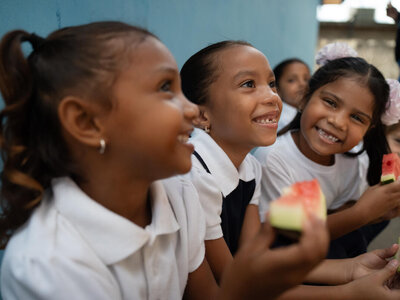Bolivarian Republic of Venezuela
- 5.1 million
- people urgently require food assistance
- 750,000 people
- reached by WFP in 2025
- 29.4 million
- population
The food security situation in Venezuela remains critical, with 5.1 million people urgently needing food assistance.
Economic access to good quality and nutritious food is a challenge for many families as food-price increases erode purchasing power.
The frequency and intensity of disasters such as floods, droughts and landslides, further poses a major challenge to agriculture, food production and livelihoods.
The World Food Programme (WFP) is focused on life-saving food assistance to vulnerable populations. Communities, families, children and more than a dozen partners rely on our proven ability to reach even the most remote areas – always prioritizing those in greatest need.
We provide school meals, assist vulnerable communities with food and/or resilience-building interventions, and support climate-risk management and the strengthening of food systems infrastructure and logistical capacity. We continue to apply age, gender and diversity lenses throughout all our programmes, including tailored interventions to meet the needs of people with disabilities and of Indigenous communities.
WFP urgently requires additional funding to sustain critical support for the most vulnerable populations in Venezuela.
What the World Food Programme is doing in Venezuela
-
School meals
-
The healthy growth and development of schoolchildren lies at the heart of WFP’s work in Venezuela. Our school meals programme reaches more than 330,000 people across over 1,100 schools, including students with disabilities – serving as a vital lifeline. The primary recipients are children, with additional support temporarily provided to their families in remote and highly vulnerable areas. The stability and quality of the programme – recognized by both recipients and school personnel – offer essential nourishment for children, with meals for children aged under 3 years complemented by specialized nutritious foods. This offers relief for families, while also boosting school enrolment and attendance. Nutrition education and community‑engagement activities are fully integrated into the school meals programme.
-
Food assistance and livelihoods
-
Capacity strengthening
-
Emergency preparedness and response
-
Coordination
Venezuela (Bolivarian Republic of) news releases
Go to pagePartners and donors
Find out more about the state of food security in Venezuela (Bolivarian Republic of)
Visit the food security analysis pageOperations in Venezuela (Bolivarian Republic of)
Contacts
Office
Avenida Francisco de Miranda, Edificio Parque Ávila, Caracas 1060, Miranda, Venezuela
Caracas
Venezuela






